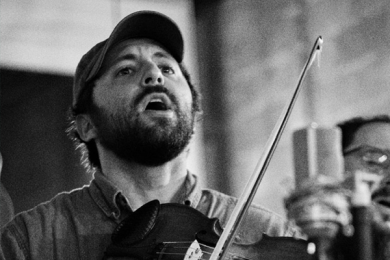Mike Daisey versus This American Life and more news and notes from week of 3/12-3/18!
News
‘This American Life’ versus Mike Daisey
You have likely already heard about the recent controversy between the public radio program This American Life and theater maker/monologist Mike Daisey. Below are a bunch of links with various details and angles on the story as well as some interesting commentary responding to a bunch of different elements of the story.
The most salient details are that Mike Daisey recorded a story about unpleasant practices at factories in China where Apple products are made for This American Life that was aired in January. There were many details of the story that it has now been uncovered were inaccurate and in some cases just plain outright lies from Mike Daisey. This American Life then retracted the story and aired an episode of their program about the controversy wherein they spoke with a contentious character from Daisey’s story and with Mike Daisey himself.
There are a lot of conversations to have related to this story and they are happening all over the place. This American Life clearly failed to properly fact check a story that made very strong statements and it turns out had information that was easily disproven. Mike Daisey clearly lied directly to the producers of This American Life when they asked questions about his story both prior to airing it and again after questions started to come up after it had been aired.
I’ve read interesting things about what expectations should be when factual information is presented in a theatrical context. Mike Daisey originally wrote and performed his story about Chinese factors for theater audiences. People who work for This American Life saw a performance and asked him to adapt the piece for their program. I would contend that when experiencing a piece of theater, or any art, there should be minimal expectations of hard fact. If you see the phrase ‘based on a true story’ after the title card of a movie you can’t realistically expect to see anything remotely resembling a documentary. And if you’re watching a documentary you should be very aware that you’re being given specific information in a specific way that isn’t about simply presenting hard facts.
That doesn’t mean it’s okay that Mike Daisey overtly lied to the producers of This American Life or that it's okay he doubled down on lying about the fictional elements of his show when asked directly about their accuracy.
I’ve also ready interesting things about how easy it was to fact check some of the inaccuracies of the original piece and how disappointing it is that This American Life didn’t apply greater journalistic rigor before airing the story. Part of the complaint and concern on this side is that now people will be overly skeptical of reports of poor work conditions in Chinese factories because they were so taken in by this inaccurate and untrue story.
Everyone is entitled to their opinions on how all the various parties reacted to their role in this controversy as well as their opinions on what this controversy says about journalism and theater and truth. Which means I’m entitled to my opinion, so I’m going to share it.
Mike Daisey wrote a response to the retraction of his original story and there was a few lines in his response that have been much mocked and maligned since he wrote them. The most prominent is probably when he said, “What I do is not journalism. The tools of the theater are not the same as the tools of journalism.”
It’s that line about the tools of theater that I’m seeing mocked quite a bit on twitter and in blog posts about this story. The implication being that Daisey is saying that lying is a tool of theater makers and isn’t that a silly and bogus claim to make after people have called you out for lying. But theater is largely about lying. A huge element of making theater is lying to get at the truth of something. That’s what Daisey is referring to, that’s what he does in the bulk of his monologues.
I think a lot of the outrage is not because this story that actually caused people to look closer at a real problem (shitty working conditions at factories where Apple products are made) was full of details that were not true but because people who listen to This American Life, much like people who go to the theater, think of themselves as smarter and more savvy than your typical person and they feel stupid for believing lies. Anyone who has ever asked “did you hear that story on ‘This American Life’” has to a certain degree felt the desire to demonstrate that they are smart and aware of things that are happening in the world. The idea that ‘This American Life’ might be misleading them can quickly become an attack on their self-image. And then it’s a short trip to an existential crisis.
My question, as someone who once absolutely loved ‘This American Life’ and who for the last few years has mostly been luke-warm towards it, is when did ‘This American Life’ become essentially a program focused on hard-fact based journalism?
One of the stories I remember getting me hooked on ‘This American Life’ was about two policemen trying to capture a squirrel that had gotten loose in a young couples’ home. The end up destroying much of the home without successfully capturing the squirrel, leaving the young couple upset and distrustful of their local police. It’s a story full of humor and humanity but I highly doubt much time was spent checking the facts of the case prior to running it. Also, celebrated memoirist David Sedaris has been an integral part of ‘This American Life’ growing into an iconic program. Sedaris is great about saying that he is trying to get at the truth of whatever he’s writing about without worrying too much about the facts. He’ll say the pants were brown if it suits the story whether or not he even remembers if he was actually wearing pants.
In ‘This American Life’s’ own description of their program they aren’t clear about whether it’s straight journalism or journalistic storytelling with room for fictional elements. Here’s a big chunk from their own ‘about our show’ page:
“We think of the show as journalism. One of the people who helped start the program, Paul Tough, says that what we're doing is applying the tools of journalism to everyday lives, personal lives. Which is true. It's also true that the journalism we do tends to use a lot of the techniques of fiction: scenes and characters and narrative threads.
Meanwhile, the fiction we have on the show functions like journalism: it's fiction that describes what it's like to be here, now, in America. What we like are stories that are both funny and sad. Personal and sort of epic at the same time.”
The phrase “the fiction we have on the show functions like journalism” seems like a perfect description of what Mike Dasiey did. His crime was in lying to the producers of the show when asked direct questions about the veracity of his story. He did not betray his theater audiences and he didn’t impugn the journalistic integrity of ‘This American Life’ because these are both contexts that accept and allow for “the tools of theater” in the service of telling compelling stories.
I get the impression that ‘This American Life’ will now rebrand itself as a fact-based journalism program, because isn’t that what’s missing on public radio, and as a former obnoxious acolyte of the program that’s disappointing. But I hope people will remember that when they originally ran Mike Daisey’s story they were happy to use fiction throughout their program and they didn’t spend a lot of time pointing out when that was or wasn’t happening.
Charles Isherwood’s New York Timesarticle on Mike Daisey
Talking Points Memo reacts to This American Life controversy.
Edward Champion writes for Reluctant Habits on theaters’ reactions to the controversy.
The full This American Life About our Radio Show page
You can listen to post retraction episode of This American Life, featuring a conversation with Mike Daisey.
Here’s a link to their page on the original Mike Daisey piece:
Episode 454- Mr Daisey and the Apple factory.
Mike Daisey in his own words
From Daisey’s bio:
“MIKE DAISEY has been called “the master storyteller” and “one of the finest solo performers of his generation” by the New York Times for his groundbreaking monologues which weave together autobiography, gonzo journalism, and unscripted performance to tell hilarious and heartbreaking stories that cut to the bone, exposing secret histories and unexpected connections.”
________
The New Play I want to highlight this week is called ‘Valhalla, Tales from the Hall of Heroes.’ It’s produced by Six Elements Theatre and opens on March 23rd, with only seven scheduled performances. The element of this show that has me curious is that it’s not being staged in a traditional theatrical space.
Jenna Papke directs this collaborative theater project. Based on the descriptions of the show I’ve seen online the show is an attempt to humanize norse gods. Sharing their back-stories with one another and perhaps revealing some of the motivations behind the odd Norse legends surrounding them. The show is billed as “featuring puppetry” and live actors as well as being “unconventional.” This, coupled with the fact that it’s being staged at the Black Forest Inn rather than a traditional theater space implies it may be an immersive experience, calling upon the audience to serve as more than just onlookers. But that is purely speculation. Let me know if I got it right and what you think should you go to the show.
Show Details
________
John Cowles Jr. died Saturday, at the age of 82.
Cowles comes from a family of newspaper owners and was very well known for community building and culture encouragement. He was one of the people responsible for convincing Tyrone Guthrie to establish a regional theater in Minneapolis.
Graydon Royce wrote a long pieced for the Star Tribune about the life and legacy of John Cowles Jr. You can read it here:
Star Tribune article
________
The Playwrights’ Center is looking for internships for various internship programs.
They have summer internships as well as upcoming fall and next spring internships for which they are seeking applications. This kind of work could be a great opportunity for directors, writers, dramaturges or theater makers of any strip to get to better know the business of making theater and to connect with other theater makers.
Descriptions of the programs and application guidelines can be found here: About Internships
________
Got news and notes we’ve missed?
Leave a comment, talk to us on twitter or facebook or even send an old fashioned email. We’d love to hear from you. [email protected]
Hope you have a week full of a solid balance of truth and fact
-Levi




